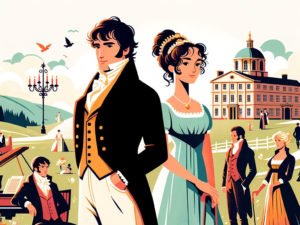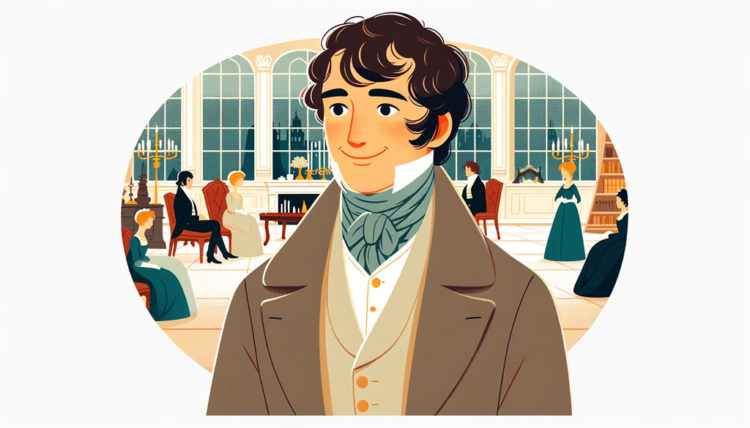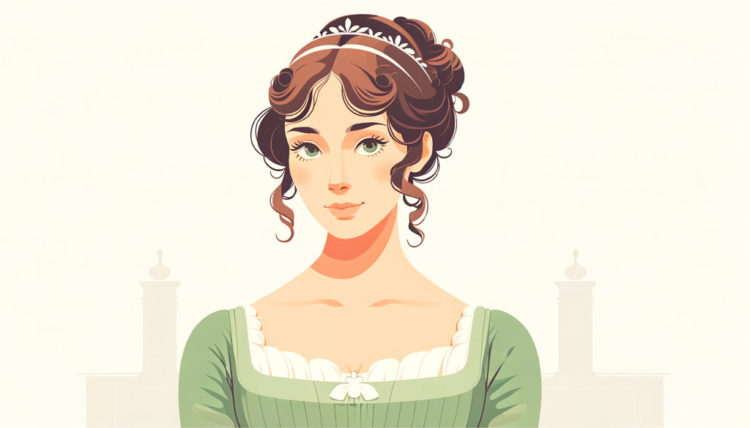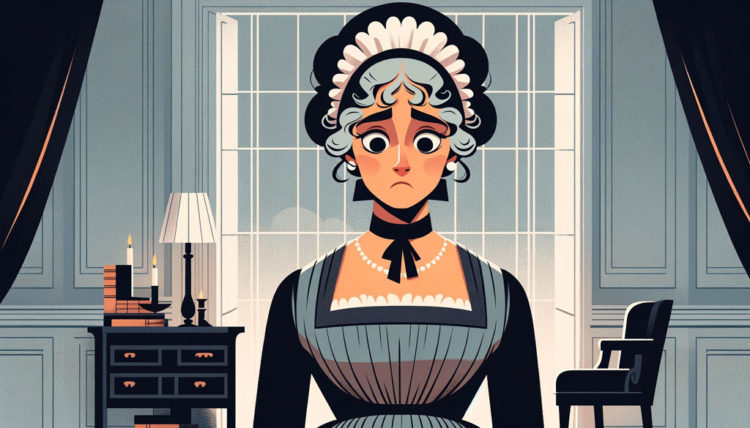“Pride and Prejudice” is a novel by Jane Austen, first published in 1813. The story is set in the early 19th century in England and centers around the protagonist, Elizabeth Bennet, as she navigates issues of manners, upbringing, morality, education, and marriage in the landed gentry society. Austen’s keen observations and wit are evident throughout the novel, which critically examines the role of women in society and the expectations placed on them, particularly in the context of marriage. The novel is celebrated for its humor, personal relationships, and its vivid portrayal of rural society. Elizabeth Bennet’s romantic relationship with Mr. Darcy, who initially appears proud and haughty, is a central theme of the book, showcasing the impact of first impressions and the journey to understanding and love.
Short Recap
“Pride and Prejudice” follows the life of Elizabeth Bennet, the second of five daughters in a country gentleman’s family. The arrival of the rich and eligible Mr. Bingley and his proud friend Mr. Darcy in the neighborhood sets the plot in motion. While Bingley quickly develops a liking for Elizabeth’s elder sister, Jane, Darcy’s initial haughtiness and his apparent snub of Elizabeth start their relationship on a rocky note. The narrative delves into the various romantic entanglements and misunderstandings among the characters, including the deceitful Mr. Wickham, who misleads Elizabeth about Darcy’s character.
The climax of the novel occurs when Elizabeth learns of Darcy’s role in disrupting Jane and Bingley’s budding romance, as well as his unexpected assistance in resolving the scandalous elopement of her younger sister, Lydia, with Wickham. This revelation leads to a transformation in Elizabeth’s opinion of Darcy.
The story culminates in the double wedding of Jane to Bingley and Elizabeth to Darcy, showcasing Austen’s critique of the era’s marriage market and social class distinctions. The novel concludes with Elizabeth and Darcy overcoming their titular traits – pride and prejudice – to find love and understanding in each other.
Comprehensive Summary of Each Chapter 0f “Pride and Prejudice”
Chapter 1: The Arrival of Mr. Bingley
The novel opens with the news that a wealthy young gentleman, Mr. Charles Bingley, has rented the Netherfield Park estate. Mrs. Bennet sees him as a potential husband for one of her five daughters. She urges her husband, Mr. Bennet, to visit Mr. Bingley, hoping to establish an acquaintance.
Chapter 2: Mr. Bennet’s Surprise
Mr. Bennet surprises his family by revealing he has already visited Mr. Bingley, initiating their connection. The family eagerly anticipates meeting Bingley at the upcoming Meryton ball.
Chapter 3: The Meryton Ball
At the ball, Mr. Bingley is well-received, and he shows an immediate interest in the eldest Bennet daughter, Jane. In contrast, his friend Mr. Darcy comes off as arrogant, offending Elizabeth Bennet by refusing to dance and calling her “tolerable, but not handsome enough to tempt me.”
Chapter 4: Jane’s Attraction to Bingley
Jane is pleased with Mr. Bingley’s attention. Elizabeth discusses Bingley’s character with her friend Charlotte Lucas and criticizes Mr. Darcy’s pride. Bingley’s sisters find Jane agreeable but criticize the other Bennets and the Meryton society.
Chapter 5: Social Visit and Judgements
The Bennet sisters visit Bingley’s sisters, who behave politely but are internally dismissive. Elizabeth’s wit and free spirit catch the attention of Mr. Darcy, despite his initial dismissal of her.
Chapter 6: Developing Relationships
Jane’s affection for Bingley grows. Elizabeth finds herself frequently in the company of Mr. Darcy, who begins to admire her, though she remains unaware of his growing interest. Charlotte Lucas warns Elizabeth that Jane should show more affection towards Bingley to secure him.
Chapter 7: Mr. Bennet’s Indifference
Mr. Bennet’s indifference to his younger daughters’ silliness and Lydia’s and Kitty’s obsession with the militia officers in Meryton are highlighted. Elizabeth and Jane are worried about their younger sisters’ inappropriate behavior.
Chapter 8: An Evening at Netherfield
Jane is invited to dine at Netherfield. Caught in the rain during her journey, she falls ill and stays at Netherfield. Elizabeth visits to care for Jane, impressing Darcy with her dedication but drawing criticism from Bingley’s sisters.
Chapter 9: Elizabeth’s Stay at Netherfield
Elizabeth stays at Netherfield to nurse Jane. During her stay, she observes the interactions between Bingley, his sisters, Mr. Darcy, and Mr. Hurst. The differences in their characters and attitudes become more apparent.
Chapter 10: Darcy’s Growing Interest
Mr. Darcy finds himself increasingly attracted to Elizabeth’s beauty and intelligence, despite his attempts to resist. Their verbal exchanges become a highlight, showcasing Elizabeth’s wit and Darcy’s evolving feelings.
Chapter 11: Conversations at Netherfield
While at Netherfield, Elizabeth engages in witty exchanges with Mr. Darcy and Mr. Bingley. Darcy finds himself increasingly intrigued by Elizabeth, despite her lower social standing.
Chapter 12: Jane’s Recovery and Return Home
Jane begins to recover from her illness. Mr. Darcy and Miss Bingley discuss the advantages of London over the country, indirectly criticizing the Bennet sisters. Elizabeth and Jane return home once Jane is well.
Chapter 13: Mr. Collins’ Arrival
Mr. Collins, a clergyman and distant cousin to the Bennets (and heir to their estate), arrives at Longbourn. He intends to marry one of the Bennet daughters as a form of restitution for inheriting their father’s property.
Chapter 14: Mr. Collins’ Pompous Character
Mr. Collins reveals his pompous and obsequious nature, especially towards his patroness, Lady Catherine de Bourgh. He spends an evening at Longbourn, where his manners are a source of silent mockery.
Chapter 15: Mr. Collins’ Intentions
Mr. Collins reveals his intention to propose to Elizabeth. Meanwhile, the Bennet sisters encounter Mr. Wickham, a handsome officer, who quickly garners their interest, particularly Elizabeth’s.
Chapter 16: Wickham’s Story
Elizabeth and Wickham converse, and he shares his history with Mr. Darcy, portraying Darcy as unjust and proud. Elizabeth sympathizes with Wickham, furthering her dislike for Darcy.
Chapter 17: Reactions to Wickham’s Story
Elizabeth shares Wickham’s story with Jane, who finds it hard to believe ill of Mr. Darcy. The neighborhood’s opinion of Darcy worsens, while Wickham gains favor.
Chapter 18: The Netherfield Ball
At the Netherfield Ball, Elizabeth looks forward to dancing with Wickham, but he is absent. Darcy asks Elizabeth to dance, and during the dance, they engage in a spirited conversation. Mr. Collins embarrasses Elizabeth with his obsequiousness.
Chapter 19: Mr. Collins Proposes
The morning after the ball, Mr. Collins proposes to Elizabeth. She refuses him, much to her mother’s distress and her father’s relief. Mr. Collins is initially unable to believe her refusal.
Chapter 20: Mr. Collins Shifts His Attention
After being rejected by Elizabeth, Mr. Collins quickly shifts his attention to Elizabeth’s friend, Charlotte Lucas. The chapter also highlights the disappointment of Mrs. Bennet and the relief of Mr. Bennet regarding Elizabeth’s refusal.
Chapter 21: Charlotte’s Engagement
The Bennet family learns that Charlotte Lucas has accepted Mr. Collins’ proposal, surprising Elizabeth. Charlotte explains her practical reasons for marrying him, emphasizing her desire for security.
Chapter 22: Mr. Collins and Charlotte’s Departure
Mr. Collins and Charlotte visit Longbourn to bid farewell before leaving for Hunsford. Mrs. Bennet is cold towards Charlotte due to her engagement to Mr. Collins.
Chapter 23: Jane’s Disappointment
Jane receives a letter from Miss Bingley, informing her of their extended stay in London and implying that Mr. Bingley will not return to Netherfield. Jane tries to hide her disappointment, and Elizabeth suspects that Bingley’s sisters and Mr. Darcy are influencing him against Jane.
Chapter 24: Elizabeth and Jane’s Speculations
Elizabeth and Jane discuss the letter. Elizabeth expresses her belief that Bingley’s sisters are attempting to separate him from Jane, possibly with Darcy’s assistance. Jane, ever optimistic, refuses to think ill of them.
Chapter 25: The Gardiners’ Visit
Mrs. Gardiner, Mrs. Bennet’s niece, and her husband visit Longbourn. They invite Jane to London with them, offering her a change of scenery and the hope of seeing Bingley again.
Chapter 26: Mr. Collins and Charlotte’s Marriage
Mr. Collins and Charlotte get married. Lady Catherine de Bourgh’s condescending approval of the match is mentioned. Elizabeth promises to visit them in the future.
Chapter 27: Elizabeth’s Visit to Hunsford
Elizabeth travels with Sir William Lucas to visit Charlotte and Mr. Collins at Hunsford. They plan to also visit Rosings, Lady Catherine’s estate, where they will likely encounter Mr. Darcy.
Chapter 28: Elizabeth at Rosings
Elizabeth, Sir William, and Maria Lucas visit Rosings. Lady Catherine is patronizing and inquisitive. Elizabeth impresses with her confidence and wit, despite Lady Catherine’s overbearing nature.
Chapter 29: Darcy and Colonel Fitzwilliam’s Arrival
Mr. Darcy and his cousin, Colonel Fitzwilliam, arrive at Rosings. Elizabeth encounters them during a visit. Darcy’s behavior is cold, while Colonel Fitzwilliam is more sociable.
Chapter 30: Conversations at Rosings
Elizabeth frequently meets Mr. Darcy and Colonel Fitzwilliam at Rosings. Darcy’s attitude towards her softens slightly. Colonel Fitzwilliam tells Elizabeth that Darcy recently saved a friend from an imprudent marriage, which Elizabeth suspects refers to Bingley and Jane.
Chapter 31: An Evening at Rosings
During an evening at Rosings, Elizabeth plays the piano, and Lady Catherine dominates the conversation. Darcy’s attention to Elizabeth is noticeable, and Colonel Fitzwilliam continues to be amiable.
Chapter 32: Darcy’s Increasing Interest
Darcy visits Elizabeth at the parsonage, where their conversation reveals his increasing interest in her. His visits become more frequent, puzzling Elizabeth.
Chapter 33: Revelations from Colonel Fitzwilliam
Colonel Fitzwilliam unintentionally reveals to Elizabeth that Darcy influenced Bingley’s decision to leave Netherfield. This revelation causes Elizabeth distress, confirming her negative opinion of Darcy.
Chapter 34: Darcy’s First Proposal
Darcy unexpectedly proposes to Elizabeth, expressing love but also noting her inferior social standing. Shocked and angered by his arrogance and his role in Jane’s unhappiness, Elizabeth vehemently rejects him.
Chapter 35: Darcy’s Letter
The next day, Darcy gives Elizabeth a letter explaining his actions. He justifies his intervention in Bingley and Jane’s relationship and reveals the true nature of Mr. Wickham’s character, including a failed attempt to elope with Darcy’s sister.
Chapter 36: Elizabeth’s Reflections
After reading Darcy’s letter, Elizabeth reflects on its contents. She begins to question her judgments about both Darcy and Wickham, realizing she may have been mistaken.
Chapter 37: Departure from Hunsford
Elizabeth prepares to leave Hunsford. She has a final uncomfortable encounter with Lady Catherine and reflects on her changing feelings and realizations.
Chapter 38: Return to Longbourn
Elizabeth returns home to Longbourn. She shares some of her experiences with Jane, but chooses not to disclose the full details of Darcy’s proposal or Wickham’s true character.
Chapter 39: Lydia’s Invitation to Brighton
Lydia Bennet is invited to Brighton with Colonel Forster’s wife. Elizabeth is concerned about Lydia’s lack of discretion and the potential for scandal, but her father allows Lydia to go.
Chapter 40: Wickham’s Changed Behavior
Elizabeth notices a change in Wickham’s behavior towards her. His attentions shift to another young lady, Miss King, who has recently inherited a fortune. Elizabeth begins to see Wickham in a new light, influenced by Darcy’s revelations.
Chapter 41: The Militia Departs
The militia, including Wickham, leaves Meryton for Brighton, heightening Lydia’s excitement. Elizabeth feels uneasy about Lydia’s behavior and the potential consequences.
Chapter 42: Elizabeth’s Reflections
Elizabeth reflects on her recent experiences, particularly Darcy’s revelations. She acknowledges her previous misjudgments and begins to see Darcy in a more favorable light.
Chapter 43: Elizabeth’s Visit to Pemberley
Elizabeth, along with her aunt and uncle, Mr. and Mrs. Gardiner, visits Pemberley, Darcy’s estate. They are impressed by its beauty and grandeur. They unexpectedly encounter Darcy, who behaves with unexpected civility and kindness.
Chapter 44: Darcy’s Changed Demeanor
Darcy introduces his sister, Georgiana, to Elizabeth. His warm and welcoming behavior surprises Elizabeth, further changing her perception of him.
Chapter 45: Meeting with Bingley
Mr. Bingley joins the group, and his friendly manners please Elizabeth. The interactions between Bingley, Darcy, and Georgiana provide Elizabeth with new insights into their characters.
Chapter 46: Lydia’s Elopement
Elizabeth receives two letters from Jane revealing that Lydia has eloped with Wickham. The family fears a scandal, and Elizabeth is distraught, realizing the gravity of the situation.
Chapter 47: The Bennets’ Distress
Elizabeth and the Gardiners hastily return to Longbourn. Mr. Bennet has gone to London to search for Lydia. The family is in distress, and the seriousness of Lydia’s actions becomes clear.
Chapter 48: Mr. Bennet Returns
Mr. Bennet returns home without finding Lydia. The family’s anxiety grows, and Mr. Gardiner continues the search in London.
Chapter 49: Mr. Collins’ Letter
Mr. Collins sends a letter expressing his condolences and imprudently suggesting that Lydia’s elopement is a punishment for the family’s lack of morality. His words aggravate the Bennets’ distress.
Chapter 50: Mrs. Bennet’s Anxiety
Mrs. Bennet is overwhelmed with anxiety about Lydia’s situation. Elizabeth and Jane try to comfort her. Meanwhile, Elizabeth regrets not exposing Wickham’s true nature earlier, believing it might have prevented the scandal.
Chapter 51: News of Lydia
Mr. Gardiner writes to Mr. Bennet, revealing that Lydia and Wickham have been found. They will marry after Wickham receives a financial settlement. The Bennet family is relieved but puzzled about who provided the funds.
Chapter 52: Mr. Bennet’s Suspicions
Mr. Bennet suspects Mr. Gardiner settled Wickham’s debts. Elizabeth, suspecting Darcy’s involvement, feels a mix of gratitude and confusion.
Chapter 53: Lydia and Wickham’s Visit
Lydia and Wickham visit Longbourn as a married couple. Lydia is unashamedly proud of her elopement, while Wickham appears untroubled.
Chapter 54: Lydia’s Slip and Darcy’s Role
During Lydia’s visit, she accidentally reveals that Mr. Darcy was present at her wedding. Elizabeth writes to Mrs. Gardiner, seeking clarification.
Chapter 55: Bingley Returns
Mr. Bingley returns to Netherfield, reigniting Jane’s hopes. He visits the Bennets, and his attentions to Jane are obvious, bringing joy to the household.
Chapter 56: Lady Catherine’s Visit
Lady Catherine de Bourgh visits Elizabeth and demands that she renounce any engagement to Mr. Darcy. Elizabeth refuses to comply, asserting her independence.
Chapter 57: Elizabeth’s Reflections
Elizabeth reflects on Lady Catherine’s visit, pondering its implications for her relationship with Darcy. She remains uncertain of Darcy’s feelings.
Chapter 58: Darcy’s Second Proposal
Mr. Darcy returns to Netherfield. He and Elizabeth take a walk together, during which Darcy proposes again, expressing unchanged affection. Elizabeth joyfully accepts.
Chapter 59: The Bennet Family’s Reaction
Elizabeth informs Jane of her engagement. The Bennet family reacts with surprise to Elizabeth’s engagement to Darcy, while Mr. Bennet seeks assurance of Elizabeth’s true feelings.
Chapter 60: Marriages and Futures
The novel concludes with the marriages of Elizabeth to Mr. Darcy and Jane to Mr. Bingley. The future of the other characters, including Lydia and Wickham, Kitty, and Mary, is briefly touched upon, ending with a reflection on the happiness of the Darcy and Bingley couples.
Chapter 61: The Novel’s Epilogue
The final chapter of “Pride and Prejudice” serves as an epilogue, tying up the remaining loose ends and providing a glimpse into the future lives of the characters.
Elizabeth and Darcy’s Life at Pemberley: Elizabeth and Mr. Darcy settle into a happy life at Pemberley. Elizabeth manages her new role as mistress of Pemberley with grace and effectiveness, winning over those who had previously doubted her suitability.
Jane and Bingley’s Relocation: Jane and Mr. Bingley eventually move to an estate near Pemberley, allowing the sisters to visit each other frequently. Their close proximity helps maintain the strong bond between Elizabeth and Jane.
Lydia and Wickham’s Situation: Lydia and Wickham’s marriage is less idyllic. They frequently move and struggle financially, often relying on Darcy’s generosity. Lydia remains in regular contact with her sisters, though her relationship with Elizabeth and Jane is tempered by their disapproval of Wickham.
Kitty’s Improvement: Influenced by her more responsible sisters, Kitty Bennet’s manners and understanding improve. She spends much of her time with Elizabeth and Jane, distancing herself from Lydia’s negative influence.
Mary’s Independence: Mary Bennet, the middle sister, finds her own path. With her sisters married and out of the house, she gains more independence and attention from her parents.
Mr. Bennet’s Visits to Pemberley: Mr. Bennet frequently visits Pemberley, finding solace and enjoyment in Elizabeth and Darcy’s happiness. His relationship with his favorite daughter remains a source of joy for him.
Mrs. Bennet’s Satisfaction: Mrs. Bennet’s primary concerns remain the well-being and marriages of her daughters. She is satisfied with the marriages of Elizabeth, Jane, and Lydia, though she continues to worry about Kitty and Mary.
Continued Acquaintance with the Bingleys and Darcys: The Gardiners maintain a close relationship with both the Darcys and the Bingleys, appreciated for their role in bringing Elizabeth and Darcy together.
Lady Catherine’s Eventual Reconciliation: Initially, Lady Catherine is displeased with Elizabeth and Darcy’s marriage but eventually reconciles with them, resuming her visits to Pemberley.
Basic Info About The Novel
- Title of the Work: “Pride and Prejudice”
- Author: Jane Austen
- Date of Publication: 1813
- Original Language: English
- Genre: Novel (Romance, Social Commentary)
- Length: The novel contains 61 chapters.
- Form and Structure: The novel is written in prose and is divided into chapters. It features a linear narrative with some letters used as narrative devices.
- Setting: The novel is set in the early 19th century, primarily in rural England (Hertfordshire and Derbyshire).
- Themes: The novel explores themes such as the influence of first impressions, the role of class and reputation in romance, the importance of marriage for women’s security, and the impact of personal pride and social prejudice.
- Publication Medium: Originally published as a three-volume novel.
- Diction: The language is formal and characteristic of the early 19th century. It’s also noted for its wit, irony, and emphasis on dialogue.
Interesting Facts About “Pride And Prejudice”
- Original Title: The novel was initially titled “First Impressions.” Jane Austen changed it to “Pride and Prejudice” to reflect the central themes more closely.
- Publication History: “Pride and Prejudice” was published on January 28, 1813. It was Austen’s second published novel.
- Anonymity of Authorship: When first published, the novel’s author was simply stated as “By the Author of ‘Sense and Sensibility’.” Austen’s name did not appear on the novel during her lifetime.
- Early Writing: Austen began writing “Pride and Prejudice” in 1796 when she was just 21 years old. It was published 17 years later.
- Family Influence: Austen’s father initially tried to get “First Impressions” published, but it was rejected by the publisher sight unseen.
- Popularity and Reception: “Pride and Prejudice” was well-received upon its publication. It has since become one of the most popular novels in English literature.
- Cultural Impact: The novel has inspired numerous adaptations, including movies, TV series, and books. The 1995 BBC adaptation and the 2005 film are particularly well-known.
- Famous Opening Line: The opening line, “It is a truth universally acknowledged, that a single man in possession of a good fortune, must be in want of a wife,” is one of the most famous first lines in literature.
- Austen’s Favorite: Jane Austen reportedly called “Pride and Prejudice” her “own darling child,” indicating a special fondness for this work over her other novels.
- Themes Beyond Romance: While known for its romantic elements, the novel also critically examines themes like social class, morality, and the role of women in early 19th-century society.
- Financial Success: The novel was a financial success for Austen. She earned more from “Pride and Prejudice” than any of her other novels during her lifetime.
- Literary Style: Austen’s use of irony, dialogue, and realistic characters has been praised and studied extensively, contributing to the novel’s enduring status in literature and academia.
Do you think Jane Austen is a literary mastermind or just overhyped? 🤔💭 Share your bold opinions in the comments! 📚🥊





Comments